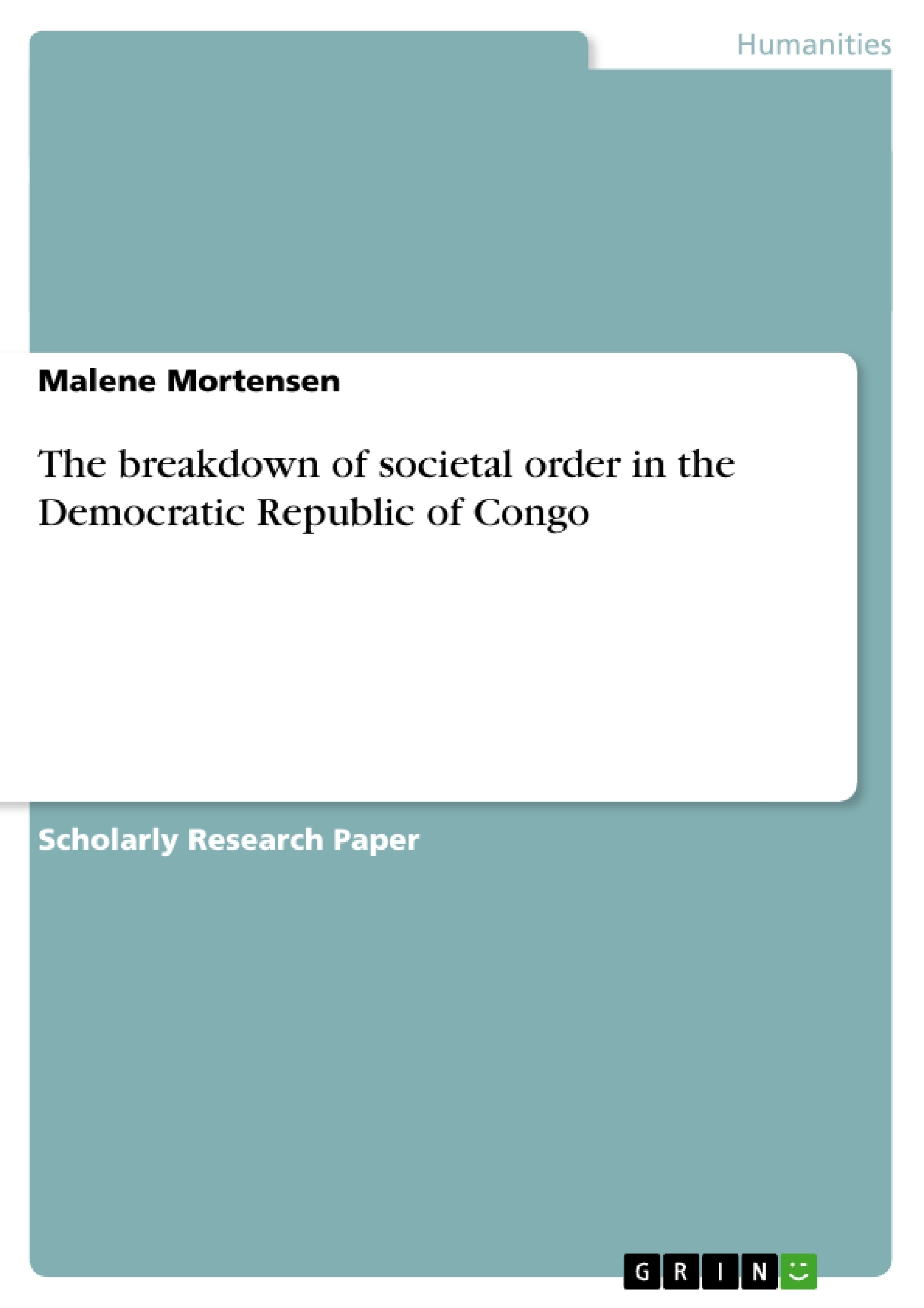"In this final paper I argue that theories on civil war today are insufficient as to fully explain the reasons that the violence in Democratic Republic of Congo[DRC] has reached an intensity and persistence, that not even the UNs second-largest peace-keeping force is to control the violent forces.
I use this a starting point for an investigation of the evolution in social structures in DRC during colonialism and independence before and after the Cold War. This shows how a breakdown of social structures and institutions led to fragile or dysfunctional neopatrimonialism under President Mobutu and a social structure after the Cold War that revolves around violence. This leads to a discussion of reasons for the persistence and the character of the violence in DRC."
Inhaltsverzeichnis (Table of Contents)
- Introduction
- Theoretical Framework
- Theories on Civil War
- A Social Approach of War
- Tracing the Breakdown of a Social Structure
- Pre-Colonial Society
- In the Colonial Era
Zielsetzung und Themenschwerpunkte (Objectives and Key Themes)
This paper examines the breakdown of societal order in the Democratic Republic of Congo (DRC) and the role of violence in this process. It argues that traditional theories of civil war are insufficient to explain the persistence and intensity of violence in the DRC, particularly the ongoing civil war. The paper explores the historical evolution of social structures in the DRC, from pre-colonial times to the present, to understand the factors that have contributed to the breakdown of societal order.
- The inadequacy of traditional civil war theories in explaining the DRC's conflict
- The impact of colonialism on the social structure of the DRC
- The evolution of patrimonialism in the DRC, from traditional to neopatrimonial systems
- The role of violence in maintaining and transforming power structures in the DRC
- The historical and social context of the ongoing civil war in the DRC
Zusammenfassung der Kapitel (Chapter Summaries)
The introduction sets the scene by highlighting the devastating violence in the DRC and the challenges it poses to conventional understandings of civil war. It outlines the paper's objective to examine the breakdown of societal order in the DRC and to explore the historical evolution of social structures that have contributed to the conflict. The theoretical framework section critiques prevalent theories on civil war, such as the "Cold War theory" and the "grievance theory," arguing that they fail to adequately address the unique complexities of the DRC's conflict. It introduces a new approach that emphasizes the societal context and historical processes shaping the violence.
The chapter on "Tracing the Breakdown of a Social Structure" delves into the evolution of social structures in the DRC over the past 150 years. It begins with a description of pre-colonial society, characterized by strong family and kinship ties and a traditional patrimonial system. This section examines the impact of colonization on Congolese society, including the replacement of traditional leaders and the exploitation of resources. It concludes with an analysis of the emergence of neopatrimonialism under Mobutu and its subsequent transformation into a system reliant on violence and crime.
Schlüsselwörter (Keywords)
The paper focuses on the complex dynamics of civil war, societal order, and violence in the DRC. It examines the theoretical framework of civil war, the historical evolution of social structures, and the role of colonialism and patrimonialism in shaping the country's conflict. The paper analyzes the specific case of the DRC, exploring the various factors that contribute to the breakdown of societal order, including the breakdown of family and kinship ties, the corruption of traditional institutions, and the emergence of violence as a means of power and control.
Frequently Asked Questions
What is the central argument regarding violence in the DRC?
The paper argues that current civil war theories are insufficient to explain the intensity and persistence of violence in the Democratic Republic of Congo, which even large UN forces cannot control.
How did colonialism impact social structures in the Congo?
Colonialism led to the breakdown of traditional institutions, the replacement of local leaders, and the exploitation of resources, creating a fragile foundation for independence.
What is "neopatrimonialism" in the context of the DRC?
It refers to a system of governance, particularly under President Mobutu, where personal power and patronage replaced formal state institutions, eventually leading to a structure revolving around violence.
What characterized pre-colonial Congolese society?
Pre-colonial society was characterized by strong family and kinship ties and a traditional patrimonial system of leadership.
Which theories of civil war does the author critique?
The author critiques the "Cold War theory" and the "grievance theory," stating they fail to address the specific historical and social complexities of the DRC.
What is the "social approach" to war mentioned in the paper?
It is a theoretical framework that emphasizes the societal context and the historical evolution of social structures as the primary drivers of conflict.
- Arbeit zitieren
- Malene Mortensen (Autor:in), 2013, The breakdown of societal order in the Democratic Republic of Congo, München, GRIN Verlag, https://www.hausarbeiten.de/document/233558


